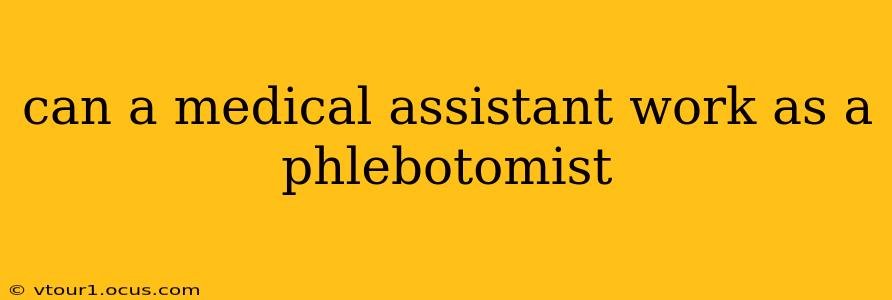Can a Medical Assistant Work as a Phlebotomist?
Yes, a medical assistant (MA) can absolutely work as a phlebotomist. In fact, phlebotomy is a common skill and duty included in many medical assistant training programs and job descriptions. However, the specifics depend on several factors, including their training, certification, state regulations, and the employer's requirements. Let's explore this further.
What is the difference between a Medical Assistant and a Phlebotomist?
It's crucial to understand the distinctions between these two roles. A medical assistant is a versatile healthcare professional who performs a wide range of administrative and clinical tasks, supporting physicians and other healthcare providers. These tasks can include taking vital signs, assisting with examinations, administering injections (depending on state regulations and training), performing electrocardiograms (ECGs), and yes, even drawing blood.
A phlebotomist, on the other hand, specializes solely in drawing blood. Their focus is on the proper techniques of venipuncture and capillary collection, ensuring patient safety and accurate sample collection for laboratory testing. While some phlebotomists may have additional responsibilities, their core competency is blood collection.
What training do medical assistants receive in phlebotomy?
Many medical assistant programs include comprehensive phlebotomy training as part of their curriculum. This training covers:
- Venipuncture techniques: Proper insertion angle, depth, and selection of veins.
- Safety procedures: Infection control, needle disposal, and handling of sharps.
- Specimen handling: Proper labeling, storage, and transportation of blood samples.
- Troubleshooting: Identifying and addressing common issues encountered during blood draws.
- Patient interaction: Building rapport with patients, addressing anxieties, and providing comfort.
Do medical assistants need additional certification for phlebotomy?
While a medical assistant's training often includes phlebotomy, some employers or states may require additional certification as a phlebotomist. This certification typically involves passing an exam demonstrating competency in phlebotomy techniques and safety procedures. This is not universally required, however. The need for additional certification depends largely on the specific employer and the regulations of their state.
Can a medical assistant work as a phlebotomist without additional training?
This is a nuanced question. If a medical assistant has received thorough phlebotomy training as part of their MA program, they likely possess the necessary skills. However, if their MA training lacked sufficient phlebotomy instruction, or if the employer mandates it, additional training might be necessary before they can independently perform phlebotomy duties.
What are the legal requirements for phlebotomy?
The legal requirements for practicing phlebotomy vary by state. Some states may require licensure or certification for phlebotomists, while others may not. It's essential for both the medical assistant and their employer to be aware of and comply with all applicable state regulations.
How can a medical assistant enhance their phlebotomy skills?
Medical assistants can further enhance their phlebotomy skills through continuing education courses, workshops, or additional certification programs. This helps maintain competency and stay updated on best practices and new technologies.
In conclusion, while a medical assistant's role often encompasses phlebotomy, the specifics of whether they can legally and ethically perform the task independently hinges on their initial training, any additional certifications obtained, and the requirements of their state and employer. Always ensure compliance with local laws and employer policies.
